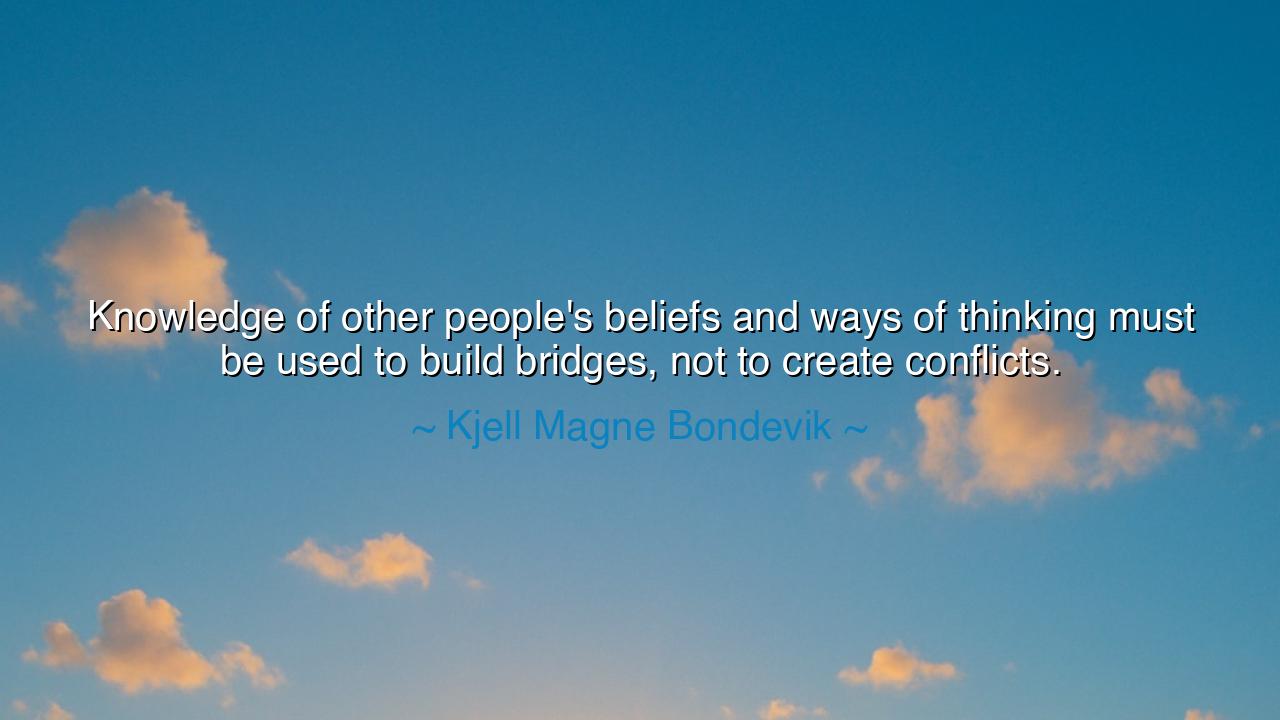
Knowledge of other people's beliefs and ways of thinking must be
Knowledge of other people's beliefs and ways of thinking must be used to build bridges, not to create conflicts.






The statesman and moral philosopher Kjell Magne Bondevik, former Prime Minister of Norway, once spoke with quiet but enduring wisdom: “Knowledge of other people's beliefs and ways of thinking must be used to build bridges, not to create conflicts.” These words shine like a lantern in an age darkened by division. They remind us that knowledge, when guided by compassion, becomes a tool for peace—but when driven by pride, it becomes a weapon of separation. Bondevik’s insight is not the rhetoric of politics, but the wisdom of the soul, born from a life dedicated to dialogue among nations, faiths, and hearts.
The origin of this quote lies in Bondevik’s lifelong advocacy for interfaith understanding and his founding of the Oslo Centre for Peace and Human Rights. Having lived through the turbulent decades of the late twentieth and early twenty-first centuries—times of terrorism, war, and political upheaval—he saw firsthand the power and peril of belief. He understood that humanity, for all its beauty and brilliance, is divided not by the existence of differences, but by the misuse of knowledge about them. To understand another culture, another faith, another mind—this is not to prepare for conquest or criticism, but to seek the path of connection.
The ancient sages knew this truth well. In the days when empires rose and fell upon the clash of faith and philosophy, there were those who sought a higher harmony. Among them was Emperor Ashoka of India, who, after the brutal conquest of Kalinga, was struck by the suffering he had caused. In repentance, he turned to Buddhism and declared that true conquest was not by the sword but by the heart. He sent emissaries not to subdue, but to learn; not to destroy, but to build bridges of compassion and understanding among the peoples of the earth. In him, the spirit of Bondevik’s words lived centuries before they were spoken—the recognition that knowledge of others must lead to peace, not power.
Yet, through the long scroll of history, mankind has too often used knowledge to divide rather than to unite. Religion has been wielded as a blade instead of a bond. Science has been twisted to justify domination instead of discovery. Culture has been turned into a wall rather than a window. The tragedy of our world is not ignorance alone—it is the arrogance that comes from knowledge without empathy. To know another’s belief is not to claim superiority over it, but to see, within its symbols and words, the same yearning for truth that beats within our own hearts.
Bondevik’s message, therefore, is a call to a higher form of intelligence—one that blends wisdom with mercy. For what use is knowledge, if it brings only conflict? What value has understanding, if it is used to wound rather than to heal? He urges us to become builders of bridges, architects of connection across the gulfs of creed, color, and custom. To build such bridges, one must listen before speaking, seek to understand before judging, and recognize that every belief—whether born of East or West, ancient or new—contains a spark of the same divine longing.
O listener, take heed of this truth: to know another is to honor the image of humanity within them. Do not fear difference; fear only the blindness that refuses to see beyond it. When you encounter another’s belief, do not look for flaws—look for light. Ask not, “How are they wrong?” but “What can I learn?” In such humility lies strength; in such curiosity, peace. The bridge is built not by grand declarations, but by the quiet stones of respect, patience, and dialogue laid one by one.
The lesson of Kjell Magne Bondevik stands clear: knowledge is sacred only when it serves harmony. Each generation faces the same choice—to wield understanding as a sword or to raise it as a torch. The wise will always choose the torch. Let your knowledge light the way toward friendship, not feud; toward unity, not division. Speak gently across the boundaries of belief. For in the end, all faiths, all nations, all hearts seek the same home—the peace that comes when we remember that we are one family beneath different skies.
So let this be your vow: build bridges wherever you stand. Use your knowledge not to harden hearts but to open them. For those who build walls are soon forgotten, but those who build bridges—between people, between nations, between souls—become immortal in the memory of humankind.






AAdministratorAdministrator
Welcome, honored guests. Please leave a comment, we will respond soon